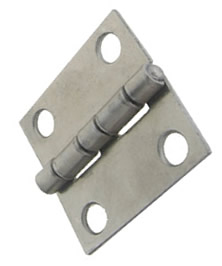
One of the decisions you’ll have to make when shopping for hinges is choosing the right material. While most hinges are made of metal, they are available in different types of metals. Some of them are harder and stronger than others, whereas other hinges are better protected against corrosion. Regardless of the application, you’ll need to choose hinges in the right material. Below is a breakdown of five common materials in which hinges are made.
#1) Cold-Rolled Steel
Many hinges are made of cold-rolled steel. Also known as cold-formed steel, it’s an iron alloy that’s rolled at room temperature. Cold-rolled steel isn’t exposed to extreme heat. Rather, it’s processed and rolled at room temperature to preserve its physical characteristics. Hinges made of cold-rolled steel are strong, durable and long-lasting, making them a popular choice for many manufacturing-related applications.
#2) Stainless Steel
Perhaps the most common material in which hinges are made is stainless steel. Stainless steel is an iron alloy that contains a small amount of carbon. The presence of carbon is essentially what distinguishes stainless steel from other types of steel. When carbon is added to iron, stainless steel is formed. Stainless steel hinges offer a high level of protection against corrosion and rust because of their carbon content.
#3) Aluminum
You can also find hinges made of aluminum. Aluminum isn’t an alloy. Rather, it’s a pure metal. Like stainless steel, though, aluminum is naturally protected against corrosion. Aluminum hinges can withstand moist and humid environments without succumbing to the degradative effects of corrosion. At the same time, aluminum hinges are lightweight and inexpensive.
#4) Brass
While not as common as cold-rolled steel or stainless steel, some hinges are made of brass. Brass hinges are extremely malleable. In other words, they can be shaped and manipulated more easily than those made of other materials. A downside to brass hinges, however, is that they are susceptible to stress-related cracking. If exposed to extreme physical stress, they may crack. Fortunately, not all hinges are exposed to physical stress. For low-stress applications, brass hinges may suffice.
#5) Bronze
A fifth material in which hinges are made is bronze. Bronze hinges are relatively strong, offer high ductility and provide decent protection against corrosion. They also exhibit protective qualities against friction. Bronze hinges can withstand friction with other metal objects without degrading. When compared to brass, though, bronze is more expensive. As a result, you can expect to pay more for bronze hinges than brass hinges.
